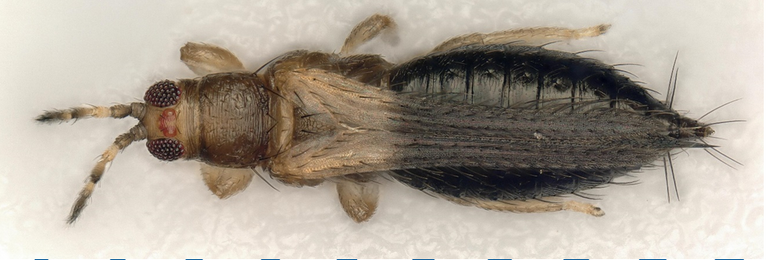In this installment of the UF/IFAS TREC’s Research Report, you’ll learn about Dr. Alexandra Revynthi and the research her lab conducts to develop Integrated Pest Management (IPM) programs to control pests of ornamental crops.
How it started
Dr. Alexandra Revynthi has been part of the TREC faculty since 2021. Even before that, she was working as a Scientist managing the Ornamental Entomology Laboratory. In the short time that Dr. Revynthi has been managing the lab, no fewer than three invasive species have interrupted the Ornamental industry in south Florida: the Hibiscus bud weevil, the horntail snail , and Thrips parvispinus.
The pests
The first invasive pest Dr. Revynthi was tasked to research was the Hibiscus bud weevil (HBW). The HBW feeds and oviposits in the flower buds of the Hibiscus plant thus decreasing the marketability of the crop. The HBW is a regulated pest by FDACS-DPI. You can learn more about the HBW, including IPM strategies, by reviewing Dr. Revynthi’s page about it.
Another invasive pest that threatened the ornamental industry was the horntail snail. The horntail snail remains of quarantine importance and is a regulated pest by FDACS-DPI. For more information on this this pest, visit Dr. Revynthi’s Horntail Snail Resource page.
Finally, Thrips parvispinus is an invasive and polyphagous pest causing significant damage to vegetable, ornamental, and fruit crops throughout the state, but especially in south Florida. This pest has caused significant damage to gardenia and mandevilla production in south Florida and is a regulated pest by the Florida Department of Agriculture and Consumer Services, Division of Plant Industry (FDACS-DPI). For the most up-to-date information from Dr. Revynthi’s lab on this pest, review the Thrips parvispinus page.
Recognition
Because of the influx of invasive pests to south Florida, Dr. Revynthi has had to be resourceful to get adequate funding for her lab. Dr. Revynthi was awarded $50,000 from the UF/IFAS Archer Early Career Seed Grants to research “Acaricide resistance on ornamentals: characterization and management”. In just two years, Dr. Revynthi has brought in over $1.5M in grant dollars to TREC. Dr. Revynthi’s contributions to the industry have not gone unnoticed. She was recently awarded FNGLA’s Friend of the Industry Award. Tal Coley, the Chief Executive Officer of FNGLA notes that Dr. Revynthi is a model for others in academia to follow. For more information on this recognition, click here.
 3
3



